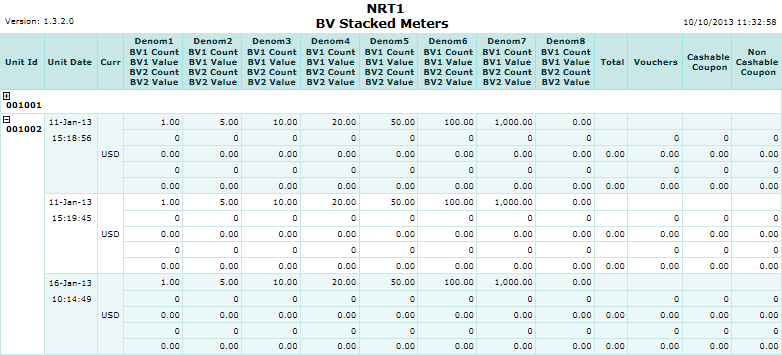<< BO Online Help >>
MONITORING
MAINTENANCE
REMOTE ADMINISTRATION
REPORT
VIEW
HELP

DATE: 2025-12-15 TIME: 23:49:26
REPORTS / CASH REPORT
| This help file covers the following topics: | |
|
|
This report provides the cumulative total count and value of bills, vouchers, and coupons which were stacked in the bill validators since the machine was put in service. The "counters" (known as "meters") are posted to BackOffice in two ways:
Here's an example of a BV Stacked Meters Report.

| 1. * Unit ID | Unit ID identifies the QuickJack unit. (grouped by unit ID) |
| 2. Unit Date | Date/time of the meter reading. |
| 3. Currency | Currency of bills, vouchers and coupons inserted into BVs. |
| 4. Denom 1-8 | Denomination of bills inserted into BVs. |
| 5. BV1 Count | Count is the number of bills inserted into BV1. |
| 6. BV1 Value | Value of the bills inserted into BV1. |
| 7. BV2 Count | Count is the number of bills inserted into BV2. |
| 8. BV2 Value | Value of the bills inserted into BV2. |
| 9. Total | Total value of all bills inserted into BVs. |
| 10. Vouchers | Count and value of vouchers inserted into BVs. |
| 11. Cash Coupon | Count and value of cashable coupon inserted into BVs. |
| 12. Non-Cash Cpn | Count and value of non-cashable coupons inserted into BVs. |
The sort order is Unit ID | Unit Date.
| Notes: | 1. | Click on unit ID with (+) sign to expand and (-) sign to collapse section (show/hide rows). | |
| 2. | All unit ID sections can be expanded (or) collapsed using "Open All" on the report toolbar. |
 This toolbar provides refresh, search, export, print, page navigation etc.
This toolbar provides refresh, search, export, print, page navigation etc.
| 1. Preview | Preview will display the report as a PDF file in the browser window. |
| 2. Style | Select style of report. (color | gray scale | no fill) |
| 3. Open All | Select "Yes" to expand and show detail lines for all collapsed sections. (unit ID with (+) sign) |
| 4. Rpt Format | Select report format (e.g. PDF, Excel) from list, then click GO to export report in selected format. |
| 5. Navigation | Use navigation controls to step forward or backward through report pages. |
| 6. Parent Rpt | Return to parent report. (if currently within child report) |
| 7. Search | Enter search string and then use find and next to step through matches. (case-insensitive) |
| 8. Refresh | Refresh report reloading with current data. |
| 9. + Print | Open print dialog box so that you can specify print options. (must install "print control" first!) |
Here's a screenshot of the report filter screen.

| 1. * Date Range | Select a date range to filter on (or) go with the default (gaming day). |
| 2. + Machine | Select any machines which you would like to filter on. (see notes below) |
| 3. + Mach Group | Select any machine groups you would like to filter on. (see notes below) |
| 4. + Mach Location | Select any machine locations you would like to filter on. (see notes below) |
| Submit button will generate and display a report in html format showing the HTML report toolbar. |
| Notes: | 1. * | The default date range is based on the GamingDayStart and GamingDayEnd system parameters. | |
| 2. * | You can enter a new date using the format yyyy/mm/dd (or) select one using the calendar tool. | ||
| 3. + | These lists are automatically populated with the machines, groups and locations for the current property. | ||
| 4. + | If no machines, groups or locations selected, the report is based on all machines for the current property. | ||
| 5. + | The Unit IDs which match the selected machines (or) groups (or) locations are included in the report. | ||
| 6. + | You can select more than one machine, group, or location within a list by using Ctrl+Click or Shift+Click. |
 |
Click in the textbox to display the calendar tool. Use the "<" and ">" links to navigate to the previous or the next month. Click on a day within the month displayed to change the date. |